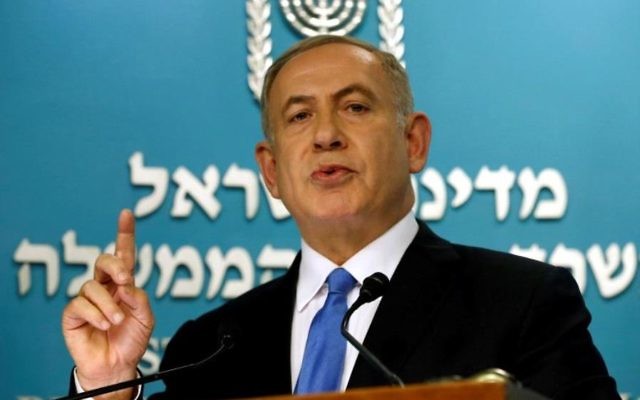Netanyahu: A ‘useless conference’
WHEN 70 countries assembled in Paris to talk Middle East peace on Sunday, there was one notable absence: Israel.
WHEN 70 countries assembled in Paris to talk Middle East peace on Sunday, there was one notable absence: Israel. The ministers of the Jewish State were in Jerusalem instead, hearing their leader call the event a “useless conference”.
Prime Minister Benjamin Netanyahu, at a business-as-usual cabinet meeting, told ministers that the conference was a Palestinian-French plan to “force terms on Israel that conflict with our national needs”.
Nobody argued with him in the meeting, though later in the day Opposition Leader Isaac Herzog lashed out at him, saying he should have gone to argue Israel’s case in Paris and “not run away from the battleground”.
It’s unclear whether Netanyahu was invited for the main conference or just for meetings on the sidelines, but he took the view that any attendance would have lent legitimacy – and especially in view of the end-of-event declaration that was brewing, he was determined to stay away. The declaration embraced the anti-settlement United Nations resolution of December 23 and the principles of the tough-talking speech that US Secretary of State John Kerry gave shortly afterwards.
As well as reaffirming support for the two-state solution the declaration implied criticism of Netanyahu’s rightist government, kept afloat by politicians who, unlike him, don’t support the two-state solution. It called on both sides to reaffirm commitment to a peace deal, thus “disassociating themselves from voices that reject this solution”. The declaration also urged Israel to “fully end the occupation” in the context of a peace deal, and said that it should urgently end settlement activity.
The senior Palestinian official Saeb Erekat was delighted by the conference. He said that every country present “created a momentum in rejection to the Israeli occupation and its settlement enterprise on the land of Palestine” – and helped to send a message “to Israel, the occupying power”.
The angry reaction in Israel wasn’t limited to the government and the political right. Centrist politician Yair Lapid argued that the event was organised to single out Israel for criticism. “I wonder why this kind of summit was never called over the killing of a million-and-a-half people in Syria, rather than focusing on Israel and the Palestinians,” he said sarcastically.
Some Israeli organisations saw it as a more genuine effort to advance peace. The Geneva Initiative, a pressure group that calls for a peace deal, welcomed it, saying that it is keen to work “with any international actor who is willing to advance the two-state solution”.
Sources in Jerusalem say that despite the criticism of Israel, the conference was milder than they feared. The closing statement didn’t refer to Jerusalem as occupied, and it did criticise “continued acts of violence”, an apparent reference to Palestinian terrorism. Nevertheless, they are resolute that only direct Israeli-Palestinian negotiations will bring peace, and that international conferences like this one make things harder, not easier.
Among participants, the conference was widely seen as less aimed at a breakthrough, and more as a rally in favour of the two-state solution before the uncertain Donald Trump era begins. They declared a negotiated peace that leads to a Palestinian state as the only path, and warned against moves that the Israeli right advocates for increasing control on the West Bank – moves which some believe Trump may support.
Fears related to what Trump’s policy may be seemed to hover in the background of many a statement made, including the warning of French President Francois Hollande that the two-state solution “appears threatened”. For many of those attending, including Kerry, it was a last-ditch attempt to preserve the Middle East policy of the Obama era.
This made Netanyahu all the keener to dismiss it. “I must say that this conference is among the last twitches of yesterday’s world,” he declared. “Tomorrow’s world will be different – and it is very near.”
NATHAN JEFFAY


comments